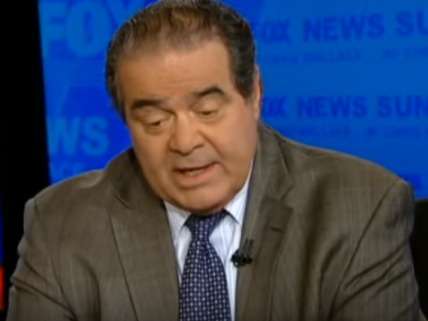What Did Scalia's Second Amendment Cover?
The late justice left unresolved the constitutionality of "assault weapon" bans and restrictions on carrying guns in public.

In my column yesterday, I said Antonin Scalia's majority opinion in District of Columbia v. Heller, the 2008 decision in which the Supreme Court concluded that a handgun ban was inconsistent with the Second Amendment right to armed self-defense, "strongly implied that nearly every other existing gun control law would pass constitutional muster." National Review's Charles C.W. Cooke thinks that gloss goes too far, at least with respect to Scalia's own views on the Second Amendment.
Cooke cites a 2012 Fox News interview in which Scalia reserved judgment on the question of which weapons are covered by the Second Amendment. "My starting point and ending point probably will be what limitations are within the understood limitations that the society had at the time," he said. "They had some limitation on the nature of arms that could be born. So we'll see what those limitations are as applied to modern weapons."
Since "the right of the people to keep and bear arms" refers to weapons that one person can carry, Scalia said, "It doesn't apply to cannons." Asked if the covered weapons might include semi-automatic rifles with 100-round magazines like the one used in the 2012 massacre at a movie theater in Aurora, Colorado, he said, "We'll see." What about "hand-held rocket launchers that can bring down airplanes"? Again, "It will have to be decided."
If Scalia had been confronted by a case that raised the issue, I am pretty sure he would have found a way to uphold federal restrictions on rocket launchers, which seem to fall into the "dangerous and unusual" category that Heller placed outside the Second Amendment's scope. It seems less likely that he would have deemed an "assault weapon" ban constitutional, since the guns covered by such laws are by no means unusual; to the contrary, they are highly popular among law-abiding gun owners. To put it another way, they are "in common use for lawful purposes," which by Heller's logic suggests that owning them is constitutionally protected.
That is the view the U.S. Court of Appeals for the 4th Circuit took in a decision this month. Two other federal appeals courts, the D.C. Circuit and the 7th Circuit, have upheld "assault weapon" bans, setting up a split that the Supreme Court may decide to address. Cooke notes that when the Supreme Court declined to hear an appeal challenging the 7th Circuit's ruling, Clarence Thomas vigorously objected, and Scalia joined that dissent. "I cannot imagine that Scalia signed onto the dissent because he hoped to prove Heller had no teeth at all beyond prohibiting absolute handgun bans," Cooke writes.
It seems pretty clear that Thomas would have voted to overturn the Highland Park, Illinois, law that the 7th Circuit upheld, and Scalia may well have decided to join him. But I am not at all sure there would have been three more votes for that position. Much would depend on the extent to which the other justices buy into the popular mythology concerning "assault weapons," to the effect that they are deadlier than other guns and uniquely suited to mass murder. The other justices might also take the view that the right to armed self-defense is adequately protected as long as handguns, shotguns, and rifles without "military-style" features are available.
What about restrictions on carrying guns in public? In 2012 a 7th Circuit panel (different from the one that later upheld the Highland Park "assault weapon" ban) ruled that the right to armed self-defense extends beyond the home, making Illinois' highly restrictive carry-permit law unconstitutional. It stands to reason that a blanket ban on carrying guns in public is inconsistent with the right to "bear" arms. Yet Scalia in Heller noted that "the majority of the 19th-century courts to consider the question held that prohibitions on carrying concealed weapons were lawful under the Second Amendment or state analogues." That suggests the right to bear arms is the right to carry them openly, which is not the preferred practice among people who carry guns for self-defense. Scalia himself might have endorsed that conclusion, but I don't know if four other justices would have agreed.
Heller did approve "laws forbidding the carrying of firearms in sensitive places," and it's not clear how broad such laws can be without running afoul of the Second Amendment. Under the federal Gun Free School Zones Act, for instance, legally carrying guns in some cities can be difficult or impossible.
Still, I think Cooke is right that my gloss on Heller underestimates its potential reach. While the decision seems designed to protect existing gun control laws at the federal level, it leaves unresolved the constitutionality of state or local laws banning "assault weapons" or restricting the carrying of guns outside the home.
